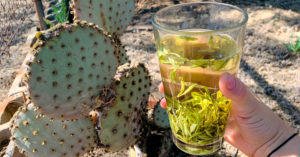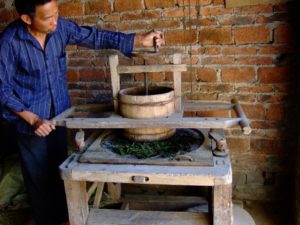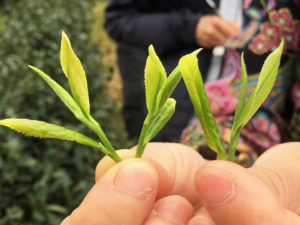
The best of the Chinese green teas have arrived in Tucson. Spring is always an exciting time for us. We love green tea, and as a category, it is our best seller. Along with our green tea, our best yellow and white teas are also arriving.
This year has given us a chance to validate the business values that we have been working on for the last 18 years, very often going against the grain of the American and European tea markets.
Having ethical values doesn’t mean much if you can’t deliver the goods. Not once or twice but year after year, getting better every year. For me, as the founder of the company and its chief architect, my question for at least the first ten years was, “do we have a viable company?”
Questions like these are especially relevant in 2020, the year of the COVID-19 Pandemic. We survived the Great Recession, but this crisis is something else entirely.
On Chinese New Year, in China, the whole country was locking down to the village level. Large boulders in the road blocked delivery of the early coffee crop in Yunnan. I got invited to a WeChat group of tea makers and government officials, the major theme of the group centered around not being critical of the government. The shutdown spread around the world, along with the disease. The service part of our teahouse closed in the middle of March. Zhuping was on the phone to China every night and continues to be. We have been confident throughout the process. Our values had given us the structure that we needed to deliver the goods. Let me explain.
We believed from the beginning that ‘direct trade’ and complete transparency regarding our tea makers was essential. This is a core principle. At that time this was not the case and continues to be rare in the industry. Sources were treated as trade secrets. We questioned not only the ethics but also saw proprietary information as a business weakness. No one offered any information about what was going on on the ground.
We buy from 35 to 50 different producers across China every year and maintain close relationships with them, as well as scores of others. We oriented our business around them, not just by buying their teas but by actively promoting their knowledge and commitment to the craft to tea making.
We also buy tea differently than other tea buyers. For most buyers, the conversation revolves around price, specifically whether the buying price allows the reseller good margins. With the price at the center of the discussion, there may be respect for good business practices between the buyer and seller. However, there is no respect for the skill of the tea maker in that conversation, nor will the buyer even get to see or taste teas that are above the range suggested by the conversation.

Most of our producers dedicate themselves to the art of tea making. Our conversations revolve around quality. They know that all of the quality tea they make will sell every year. We compete with Chinese or Japanese buyers that are more interested in quality. We all want a chance to get that quality, and we all show up every year. European or American buyers aren’t in this market for quality. To be fair, outside of China, Japan, Korea, and Singapore there is no real market for quality tea.
Even when we buy more orthodox tea, we want the best quality of that grade, too. All of our conversations are about quality, and we pay the price. We feel that gives more respect to the tea makers, and we never have it in the back of our minds that we have to protect ourselves from being cheated. Disrespect is hard to disguise.
They have rewarded us not only with their teas but also by supplying us with a depth of information unheard of in the tea industry. That information is an essential factor in being transparent. It also helps to establish authenticity. We believe that we owe our customers proof of value based on reality, not marketing. This kind of detailed information is hard to come by in China, or anywhere else for that matter.
Information from tea makers is not enough, however; it needs validation from tea scholars and scientists, not to mention local tea councils. Beginning the fall of 2003, Seven Cups started building relationships with the three tea oriented research institutions in Hangzhou, namely the Hangzhou Tea Research Institute, China COOP, and Chinese International Tea Culture Institute.
In every area that we sourced tea, we also established relationships with the local governments. In doing so, we were able to help tea makers build more reliable support with local governments at a time when private enterprise was beginning in China. That, of course, helped us to navigate the complicated logistics of getting tea exported from China. We were even awarded a Chinese export license in 2008, and while changing export laws made it unwieldy to use, it still strengthened our sourcing network.
We have a lot of connections with logistic professionals well. These are old and trusted relationships. Something going wrong in the supply chain is a common problem, and it has been a long time since we worried about a shipment making it to our warehouse. We make our decisions based on reliability; one reason you will never see us using the Chinese Post.
Relationships are timely and expensive to maintain and don’t demonstrate their value until something goes wrong. We all know a lot went very wrong this year. But by chance and desire, the tea harvest is happening on the regular schedule. The supply chain is backed up for months and is struggling to move. For a lot of companies doing business in China, products scheduled for delivery in March will not be delivered until September.

Seven Cups will still have our first teas of the season available for sale in the middle of April. We worked extra hard to make that happen, and the structure we have taken 18 years to develop is what gave us that opportunity.
When we started our company, we wrote a mission statement. Our goal was to enhance the lives of everyone that the company touched. I’ve mentioned the contacts in China, but there are other essential relationships required to close the circle: our staff, and our customers.
We have very high standards when it comes to our customers for delivering service and quality products. We price our products based on our costs and a reasonable margin. We did not raise the price of the tea on our teahouse menu since 2008. We are aware that we sell our tea cheaper retail than you would find if you bought it in China. Even though this year is more expensive because of the increased logistical costs, you will only see a small bump to our price. We are not going to take advantage of being first in the market when so many of us face hard circumstances.
2020 will be the second economic crash. We expect to make it through because of our customers. Just like our relationships in China have made it possible to do business, relationships with our customers have made it possible to stay in business. Our tea house, our biggest profit center, has been closed for more than a month, but our customers, locally, have still come by our shop to buy tea, and our eCommerce customers from around the world have kept us afloat.
Our staff, 10 of us, continue to do the job that they do year in and year out since we started. Most days, we look forward to going to work. No one has left during the crisis, and we will do what we can to keep doing our jobs. Even though there are no customers in our teahouse, we still make sure there’s no dust in the shop. We are committed to our values in every detail, every day.
So far, after eighteen years of following ethical business standards, which have many times limited our profits and growth, we continue to progress in good times and bad and get better at doing our jobs. I have stopped wondering if we have a viable business. I want to sincerely thank the many thousands of people that we interact with each year.
Austin Hodge
Founder
